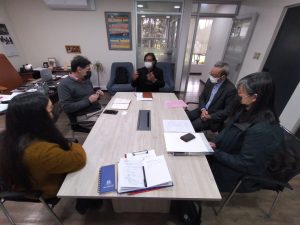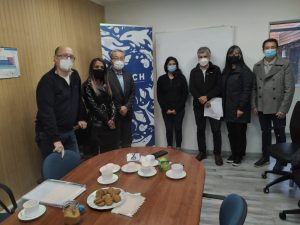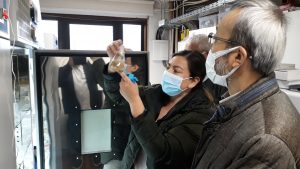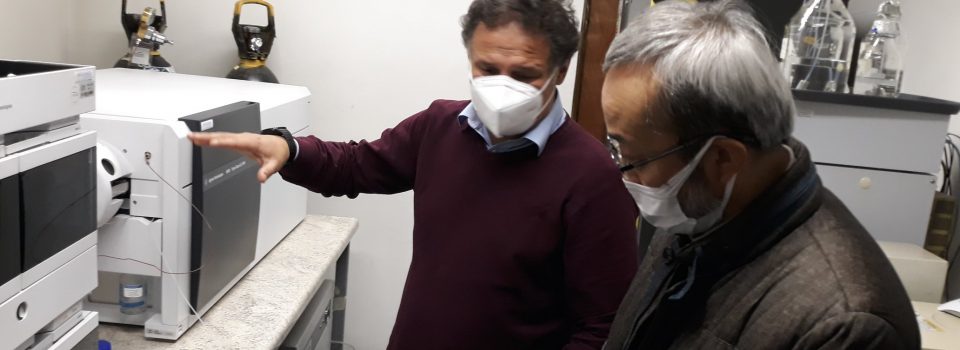JICA-Chile representatives visit MACH project’s associated centers and laboratories.
April 29th, 2022 Algae Monitoring project in Chile (MACH) arises as a Chilean-Japanese collaboration, financed with Science and Technology for Sustainable Development Associative Research Program (SATREPS)resourcesfrom Japan’s Government, through its International Cooperation Agencies (JICA) and Science and Technology Agency (JST).
Algae Monitoring project in Chile (MACH) arises as a Chilean-Japanese collaboration, financed with Science and Technology for Sustainable Development Associative Research Program (SATREPS)resourcesfrom Japan’s Government, through its International Cooperation Agencies (JICA) and Science and Technology Agency (JST).
Japan is represented by the Universities of Hiroshima, Kyoto and Okayama, as well as National Fisheries Science Research Institute from Chile, for its part, is represented by Universities De la Frotera Antofagasta, Los Lagos and Fisheries Development Institute through its Center for Harmful Algae Studies (CREAN). This project also has the approval, sponsorship and participation of national institutions such as the Undersecretariat for Fisheries and Aquaculture (SUBPESCA), the National Fisheries and Aquaculture Service (SERNAPESCA), Ministry of Health and the Chilean Agency for International Development Cooperation. (AGCID). Likewise, it has the collaboration of the Salmon Technological Institute (INTESAL) and Mussel Farming Technological Institute (INTEMIT).
This scientific consortium aims to monitor and study Harmful Algal Blooms processes (HAB) on Chilean coast under Humboldt current and the southern fjord system influence, to achieve a forecast model for certain blooms, using an approach based on microalgae knowledge and interaction and environmental bacteria associated with microalgae, using tools from microbiology, molecular biology, DNA sequencing and bioinformatics.
 On Wednesday, April 20th and Thursday, April 21rst, the resident representative of Japan’s International Cooperation Agency (JICA), Mr. Shoji Ozawa, and the deputy representative, Mrs. Toshimi Kobayachi, visited laboratories associated Algae Monitoring centers in Chile (MACH facilities, https://www.mach-satreps.org project/es/project/), with the aim of reviewing and discussing agreements and objectives agreed by all the academic, political and private institutions that make up MACH project, for its execution during the 2022 period.
On Wednesday, April 20th and Thursday, April 21rst, the resident representative of Japan’s International Cooperation Agency (JICA), Mr. Shoji Ozawa, and the deputy representative, Mrs. Toshimi Kobayachi, visited laboratories associated Algae Monitoring centers in Chile (MACH facilities, https://www.mach-satreps.org project/es/project/), with the aim of reviewing and discussing agreements and objectives agreed by all the academic, political and private institutions that make up MACH project, for its execution during the 2022 period.
In this context, JICA-Chile representatives visited Applied Microbial Ecology Laboratory (EMALab) at the Universidad de la Frontera (UFRO)facilities during Wednesday 20th morning , led by Dr. Milko Jolquera, MACH project scientific director. Other visits to UFRO were to the Bioresources Scientific and Technological Nucleus (BIOREN) and the Research and Postgraduate Vice-Rectory. On Wednesday afternoon, JICA representatives went to Universidad de Los Lagos, Osorno campus, to visit Dr. Gonzalo Gajardo’s laboratory he is MACH researcher and head of the Genetics, Aquaculture & Biodiversity laboratory. After this meeting, thay visited the research and postgraduate vice-rectory.
 On Thursday 20th,morning, JICA representatives visited Fisheries Development Institute (IFOP) offices, to meet with Dr. Leonardo Guzmán, head of the aquaculture division, and Dr. Oscar Espinoza, IFOP Center for of Harmful Algae Study (CREAN) director, both researchers MACH. Associated. After these meetings, thay visited CREAN center, to tour its facilities and talk with various work teams. These teams and the analyzes carried out in the center are a fundamental part of taking samples for monitoring microalgae in the South and Austral macrozones, and part of these data are used for the studies carried out in the MACH project, in conjunction with the aforementioned institutions.
On Thursday 20th,morning, JICA representatives visited Fisheries Development Institute (IFOP) offices, to meet with Dr. Leonardo Guzmán, head of the aquaculture division, and Dr. Oscar Espinoza, IFOP Center for of Harmful Algae Study (CREAN) director, both researchers MACH. Associated. After these meetings, thay visited CREAN center, to tour its facilities and talk with various work teams. These teams and the analyzes carried out in the center are a fundamental part of taking samples for monitoring microalgae in the South and Austral macrozones, and part of these data are used for the studies carried out in the MACH project, in conjunction with the aforementioned institutions.
